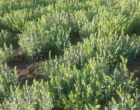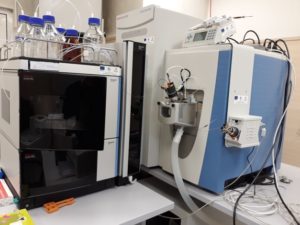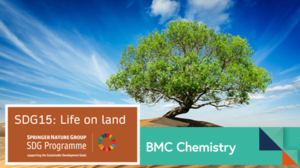
Welcome to our SDG Editorial Board Members blog collection. We are hearing from the Editorial Board Members of the BMC Series journals whose work aligns with achieving the Sustainable Development Goals. Here you can find other posts in this collection, grouped with the tag ‘SDG editorial board members‘.
The conservation and sustainable use of medicinal plant resources is attracting the attention of both scientists and the general public.
Medicinal plants
In recent years, an increasing interest in medicinal plants and a growing therapeutic use of phytochemicals has occurred. Medicinal plants are applied for the production of phytopharmaceuticals, nutraceuticals and cosmeceuticals and their use is growing rapidly throughout the world: demand for wild resources has increased by 8–15 % per year in Europe, North America, and Asia in recent decades. That is why the problem of the conservation and sustainable use of medicinal plant resources is attracting the attention of both scientists and the general public.
Sustainable harvest
Bulgaria is rich in medicinal and aromatic plant resources but recently they are being harvested in increasing volumes, largely from wild populations. As a result, many of these plants are now endangered species. The need of sustainable use of these valuable resources in Bulgaria resulted in a project supported by the EU and the Bulgarian government and dedicated to Sustainable utilization of bio resources and waste from medicinal and aromatic plants for innovative bioactive products. It is an interdisciplinary project coordinated by the Institute of Organic Chemistry with Centre of Phytochemistry (IOCCP) at the Bulgarian Academy of Sciences and involves five more Bulgarian research institutions.
 Natural reserves and wild nurseries are good ways to protect the plants and retain their medical efficacy in their natural habitats. However, it is not possible to designate every natural wild plant habitat as a protected area, so cultivation is the alternative. Cultivation under controlled conditions can result in higher yields of active constituents and guarantees production stability. Increased cultivation contributes to substantial decrease in the harvest volume of wild medicinal plants, benefits the recovery of their wild resources, and decreases their prices. In addition, cultivation can increase the income of people in rural communities and thus support the sustainable development of these communities.
Natural reserves and wild nurseries are good ways to protect the plants and retain their medical efficacy in their natural habitats. However, it is not possible to designate every natural wild plant habitat as a protected area, so cultivation is the alternative. Cultivation under controlled conditions can result in higher yields of active constituents and guarantees production stability. Increased cultivation contributes to substantial decrease in the harvest volume of wild medicinal plants, benefits the recovery of their wild resources, and decreases their prices. In addition, cultivation can increase the income of people in rural communities and thus support the sustainable development of these communities.
Sustainable processing
The processing of medicinal plants for obtaining extracts and active constituents is an important part of their utilization. The increasing environmental concerns over the last decades have motivated the development of sustainable extraction strategies that follow the basic principles of green chemistry. So an important aim of the abovementioned project is the development of sustainable extraction approaches to obtain various plant extracts with minimum impact on the environment (lower energy consumption, renewable solvents, etc.). Green extraction technologies are able to reduce or eliminate the use of hazardous substances and limit the cost of solvent waste disposal; among them are supercritical fluid extraction, pressurized liquid extraction, and ultrasound-assisted extraction, all considered sustainable techniques.

Utilization of wastes
Industrial processes that utilize medicinal and aromatic plants (MAPs) generates various kinds of residues like residual biomasses from distillation of aromatic plant and non-utilized parts of medicinal plant. The extraction residue is often treated as a waste to dumping. However residual biomasses should not be considered as waste as these can actually be recycled. These biomasses are suitable for isolation of phytochemicals like phenolics-antioxidants and converted into value added products. A good example of such utilization is the large amount of wastes generated by the production of the famous Bulgarian rose oil. One of the partner in our project, the Agrobioinstitute (Sofia) developed a technological scheme for combined utilization of waste rose biomass, aimed at the extraction of polyphenol substances and subsequent fractional extraction of polysaccharides. An additional advantage of this integrated approach is that it could be further combined with other methods and applied to other essential oil plant wastes. Valorizing by-products from the residual biomass from medicinal and aromatic plants is one of the potential ways to achieve a sustainable economy.
A success story
A success story is the one of a very popular medicinal plant, Mountain tea Sideritis scardica, endemic to the Balkan Peninsula. It is used for wound and burn healing, treatment of gastric ulcer, the common cold and mucous membrane inflammation. In the 1990’s, the collection of wild-growing Sideritis scardica became very extensive: it was in danger of extinction and was included in the Red Book list of Bulgaria. To respond to the demand of the consumers, our colleagues with the Institute of Botany developed a very productive cultivar and cultivation was gradually developing and is now very popular in rural communities with appropriate climatic and environmental conditions. We chemists studied the sustainable extraction methods and suggested the most appropriate approaches for this plant. And now, in the frame of our big project, we have recently filed a patent for a cosmeceutical based on this plant extract.
 In conclusion, the growing global demand for natural and environmentally-friendly products today has a great potential for sustainable development. The cultivation, processing and trade of high-value medicinal and aromatic plants could contribute to social equity, environmental conservation and economic prosperity.
In conclusion, the growing global demand for natural and environmentally-friendly products today has a great potential for sustainable development. The cultivation, processing and trade of high-value medicinal and aromatic plants could contribute to social equity, environmental conservation and economic prosperity.
Comments